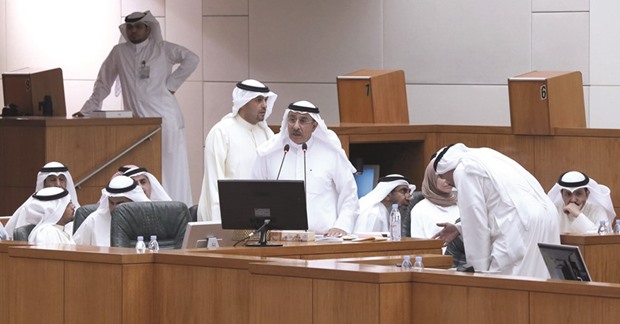Kuwait’s parliament yesterday passed a bill allowing the government to raise power and water charges on foreign residents and on businesses but exempted the Gulf state’s citizens.
Thirty-one MPs voted in favour while 17 members opposed it. The second and final round of voting will take place after two weeks.
MPs initially rejected the bill but later approved it after Kuwaiti citizens were exempted.
If given the final clearance, it will be the first time in 50 years that Kuwait raise power charges.
Like other crude exporters, Kuwait’s oil-dependent revenues dwindled since oil prices crashed by over 70% from its mid-2014 peak.
The bill stipulates to raise power charges in apartment buildings, overwhelmingly used by foreigners, from the current flat rate of two fils (0.7 cents) per kilowatt gradually to up to 15 fils (five cents) per kilowatt.
For commercial uses, it will be raised from two fils per kilowatt to 25 fils per kilowatt.
Water prices will also be more than doubled.
Electricity and Water Minister Ahmad al-Jassar told a heated debate in parliament that the government was paying around $8.8bn annually to subsidise power and water production.
If no action was taken, consumption would triple by 2035 and subsidies would rise to $25bn, the minister said.
The aim of the bill was to cut consumption by over 30%, he said.
But most lawmakers strongly rejected the government plan to raise power charges on citizens and blamed it for what they called economic mismanagement.
“This would be the biggest crime against citizens and expatriates,” Shia MP Saleh Ashour said.
Independent MP Jamal al-Omar blamed government failure for the economic crisis.
“The cause of the crisis is not the drop in oil prices alone, but also the government’s failure ... Our government is incapable of managing the country,” Omar said.
The government also plans to hike heavily-subsidised petrol prices, one of the cheapest in the world.
Kuwait has posted a budget deficit of $20bn in the past fiscal year, according to provisional figures, following 16 years of windfall due to high oil prices.
The emirate is home to 1.3mn native citizens and around 3.0mn foreigners.
Kuwait has remained the only country in the Gulf not to raise power and petrol tariffs since the sharp drop in oil prices.

Kuwaiti Electricity and Water Minister Ahmad al-Jassar speaks as Oil and Finance Minister Anas al-Saleh (centre-back) looks on during a parliament session at the national assembly in Kuwait City yesterday. The parliament discussed a government proposal to increase electricity and water fees.
